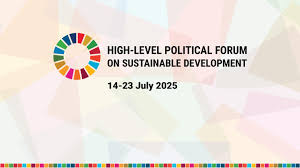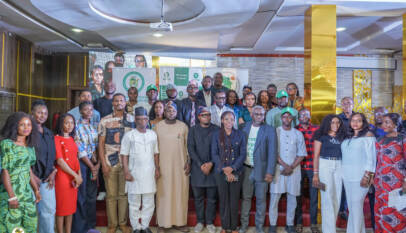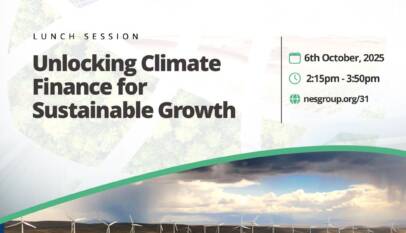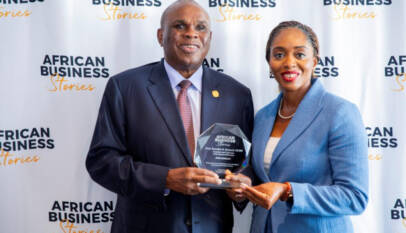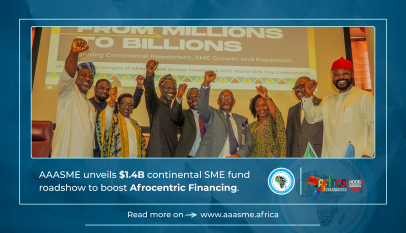2025 HLPF: Day Ghana, Nigeria, Ethiopia Presented 3rd SDGs Progress Reports
The 2025 United Nations High-level Political Forum on Sustainable Development (HLPF) brought together 37 countries, including three African nations—Ghana, Nigeria, and Ethiopia—which presented their Voluntary National Reviews (VNRs), highlighting mixed progress in implementing the Sustainable Development Goals (SDGs).
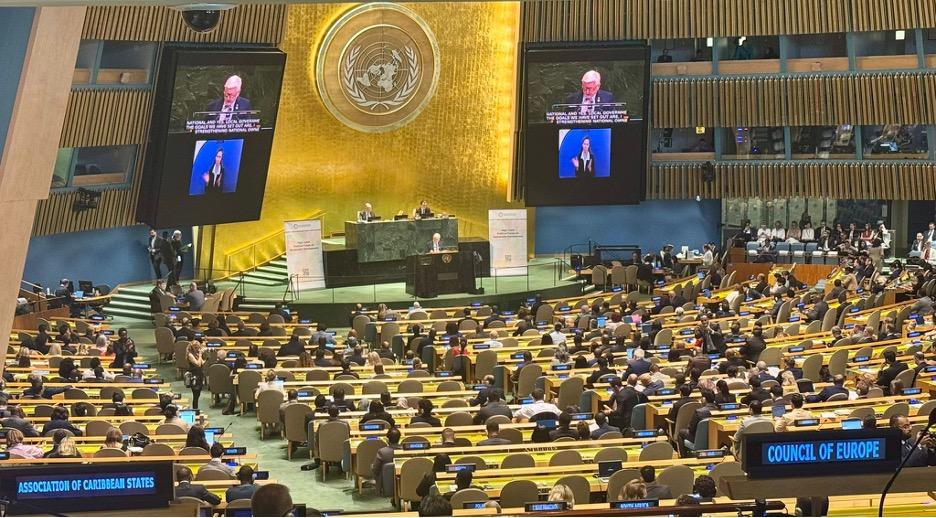
The United Nations High-level Political Forum on Sustainable Development (HLPF) is the UN’s central platform for reviewing progress on the 2030 Agenda and the Sustainable Development Goals (SDGs). The 2025 HLPF, held from July 14–23 in New York, was themed: “Advancing Sustainable, Inclusive, Science- and Evidence-based Solutions for the 2030 Agenda and its SDGs for Leaving No One Behind.”
The Forum featured the presentation of Voluntary National Reviews (VNRs) by 37 countries, including three African nations—Ghana, Nigeria, and Ethiopia—each making their third appearance since their initial submissions in earlier review cycles. Introduced in 2016, the VNR mechanism is a core component of the 2030 Agenda, enabling countries to voluntarily report progress, share experiences, and identify challenges in implementing the SDGs.
The VNR mechanism enables countries to assess progress on SDGs at national and sub-national levels, sharing successes, challenges, lessons learned, as well as innovative approaches with other UN Member States and development partners. Designed to be country-led, inclusive, and participatory, the VNR process typically involves governments at all levels, civil society, academia, the private sector, and international stakeholders.
In 2025, Ghana, Nigeria, and Ethiopia returned to HLPF as third-time presenters—joining a small group of countries demonstrating long-term institutional commitment to tracking SDG progress. Ghana previously submitted reviews in 2019 and 2022; Nigeria in 2017 and 2020; and Ethiopia in 2017 and 2020. Their latest VNRs offered an opportunity to reflect on long-term development trends, consolidate progress, and recalibrate strategies toward the 2030 Agenda.
The 2025 HLPF took place amid a global context of widening inequalities, deepening climate emergencies, and growing fiscal constraints in many African countries. For the three nations, this year’s VNRs served not only as performance reports but also as platforms to showcase resilience, policy innovation, and alignment with evolving national priorities. At the same time, they brought attention to persistent structural barriers—from gender inequality and youth unemployment to data deficiencies and environmental degradation.
This report explores how Ghana, Nigeria, and Ethiopia approached the 2025 VNR process: what they reported, how they engaged stakeholders, and what their submissions reveal about Africa’s evolving SDG journey. The analysis provides insights into achievements, challenges, and lessons learned, offering a snapshot of how African countries are navigating sustainable development in a complex and rapidly shifting global landscape.
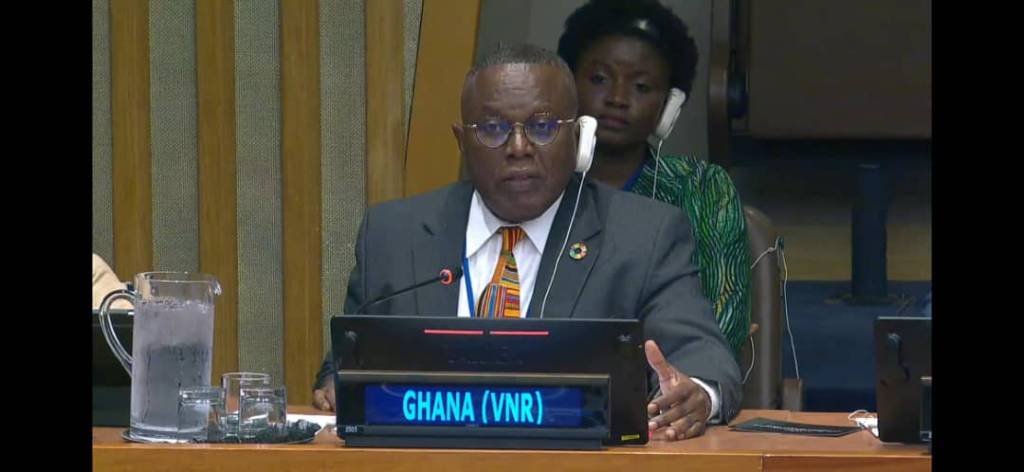
“Our Strategy: Tackle Challenges Head-on, Leave No One Behind” – Dr. Thompson
Presenting Ghana’s third Voluntary National Review (VNR), Dr. Nee Mori Thompson, Chair of the National Development Planning Commission (NDPC) and Senior Advisor to the President on the United Nations, reaffirmed his country’s commitment to the 2030 Agenda, emphasizing that the principles of participation, inclusivity, and acceleration guided their 3rd review.
He said Ghana prioritizes 5 out of the 17 SDGs, namely: good health and well-being (Goal 3), gender equality (Goal 5), decent work and economic growth (Goal 8), life below water (Goal 14), and partnerships for the goals (Goal 17). He said their progress reflects a deliberate strategy to tackle challenges while ensuring no one is left behind. “These collectively ensure that our journey toward sustainable development is holistic, people-centered, and forward-looking.”
To this end, Dr. Thompson underscored their significant gains across the five priority goals, including expanded access to maternal and child health services, increased participation of stakeholders in policy processes, and improved national SDG data coverage — from 66 indicators in 2019 to 105 in 2025.
“Our approach is both systemic and inclusive. Through a whole-of-government and whole-of-society framework, we have brought together voices from all sectors: civil society, private enterprises, academia, traditional authorities, youth groups, and persons with disabilities. This approach ensures that our development policies are not just based on data but also shaped by the lived experiences of our people. That is how we make our development efforts truly representative and impactful,” Dr. Thompson explained.
On Goal 3, Dr. Thompson reported a sharp decline in under-five mortality, from 60 per 1,000 live births in 2014 to 40 in 2022, alongside a reduction in neonatal mortality from 29 to 17 per 1,000 in the same period. Under Goal 5, he highlighted major milestones, including the passage of the Affirmative Action Law in 2024 and the historic election of Ghana’s first female vice president. Yet, he acknowledged persistent challenges under Goal 8, citing stagnant per capita GDP and high youth unemployment.
“We celebrate milestones, especially in health and gender equality, but are also mindful of the challenges that remain. Youth unemployment continues to threaten our demographic dividend, and gender gaps in income and leadership persist. These realities remind us that progress is not automatic. We must keep innovating, investing, and listening to our citizens—especially the most vulnerable—if we are to make sustainable development real and relevant,” he said.
For Goal 14, Thompson pointed to Ghana’s ratification of the WTO Fisheries Agreement and active participation in the Ocean Panel, underpinned by sustainable fisheries management and marine biodiversity conservation efforts. On Goal 17, he reported a significant increase in domestic tax revenue—from 50% in 2016 to 71% in 2023—alongside major strides in strengthening data systems and digital infrastructure, such as improved death registration and broader broadband access.
“We cannot overstate the importance of strong institutions, reliable data, and sustainable financing. Our ability to achieve the SDGs depends on how effectively we track progress, mobilize domestic resources, and ensure that all Ghanaians benefit from digital and economic transformation. We are strengthening our systems not just for better reporting, but for better governance, better service delivery, and ultimately, a better future for every Ghanaian,” he concluded.
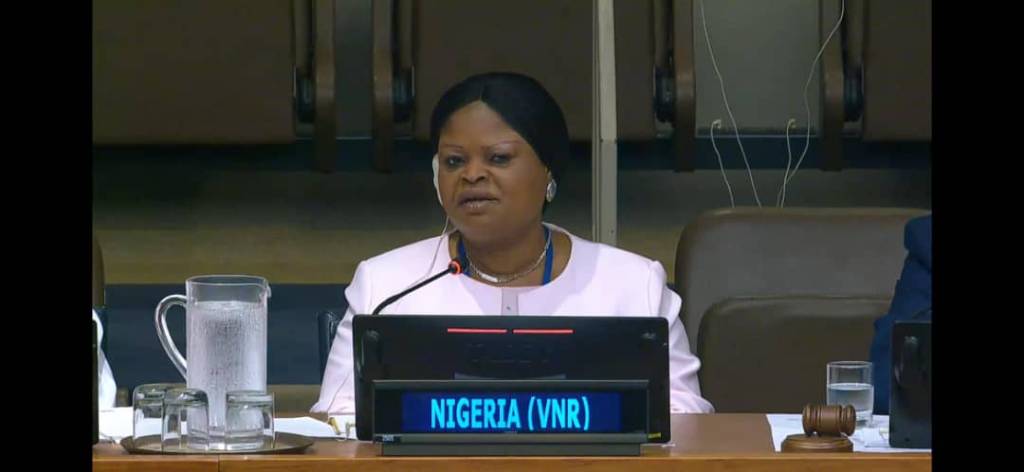
“We’ve Mixed Outcomes Due to Fiscal Constraints” – Orelope-Adefulire
While presenting Nigeria’s third VNR, Princess Adejoke Orelope-Adefulire, Special Adviser to the President on SDGs, reaffirmed the country’s steadfast commitment to the 2030 Agenda, with a strong focus on localizing the SDGs across federal and subnational levels. “With deliberate and strategic effort, Nigeria has instituted robust policies and an institutional framework at both the national and subnational levels to ensure effective and inclusive implementation of the SDGs.”
Orelope-Adefulire outlined Nigeria’s long-term commitment to sustainable development through strategies such as the Economic Recovery and Growth Plan (2017–2020), the Economic Sustainability Plan (2020), both in response to COVID-19, and the National Development Plan (2021–2025). “Nigeria developed a strategy that has been firmly anchored in the SDGs. Our current plan, in particular, aims to unlock Nigeria’s vast economic potential through broad-based, inclusive, and resilient economic transformation.”
The presidential adviser said Nigeria’s participation in the VNR process in 2017, 2020, and 2025 reflects a consistent trajectory of institutional accountability and policy learning. She highlighted that the 2025 review prioritized Goals 3, 5, 8, 14, and 17, and was informed by an inclusive national consultation that engaged every region and vulnerable group. “The 2025 VNR adopts a whole-of-government and whole-of-society approach. This inclusive and participatory process ensured that voices from all segments of society helped shape our national SDG narrative.”
While highlighting areas of progress, Orelope-Adefulire acknowledged mixed outcomes across key SDG indicators, citing fiscal constraints, limited government revenue, and global crises as factors that have slowed or reversed gains. She noted that global disruptions—ranging from the COVID-19 pandemic to climate shocks and geopolitical tensions—have significantly impacted momentum. Despite these challenges, she emphasized that Nigeria remains committed to accelerating progress toward the SDGs.
Orelope-Adefulire noted that of the 52 key performance indicators reviewed in Nigeria’s 2024 SDG Progress Report, 34.6% showed improvement, 30.8% stagnated, while 34.6% regressed. She said while government revenue remains low at 9.6% of GDP as of 2023, the tax-to-GDP ratio has seen a modest increase from 5.5% in 2020 to 6.7% in 2022. Yet, she reaffirmed Nigeria’s commitment to accelerating progress through targeted reforms, strengthened data systems, and the effective rollout of the forthcoming 2026–2030 National Development Plan.
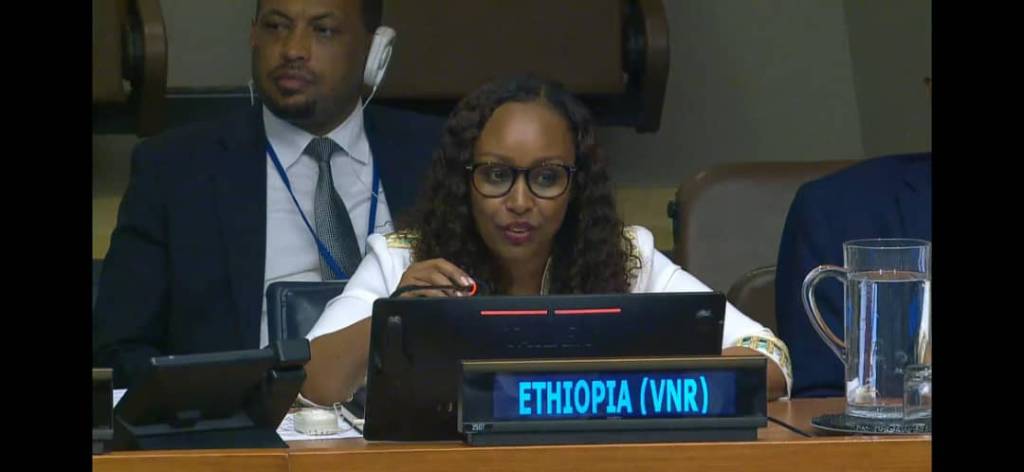
“We Have Halved Ethiopia’s Maternal Mortality” – Minister
In delivering Ethiopia’s 2025 Voluntary National Review (VNR), Fitsum Assefa Adela, Minister of Planning and Development, highlighted the country’s post-2018 reform agenda as a catalyst for SDG acceleration, describing the VNR process as a “national mirror,” reflecting both progress and challenges, while fostering greater stakeholder ownership and accountability.
“Our 2025 VNR is not just a technical report; it is a bold reaffirmation of Ethiopia’s commitment to inclusive and sustainable development. The process was deeply participatory—drawing voices from government, civil society, academia, and the private sector. We organized national consultations, subnational forums, and field surveys to ensure the review reflects the realities on the ground and the aspirations of our people.”
The Minister emphasized that the SDGs are now fully embedded in Ethiopia’s Ten-Year Perspective Plan and aligned with the African Union’s Agenda 2063 and national reform priorities. Ethiopia’s 2025 VNR was structured around the Five Ps—People, Prosperity, Planet, Peace, and Partnerships—highlighting progress in basic service delivery, food security, digital innovation, and climate action, despite persistent macroeconomic challenges and global disruptions.
“In the ‘People’ pillar, our social protection schemes are now reaching over 9.7 million citizens under the productive safety net. Our irrigated wheat initiative has enabled us to fully substitute wheat imports. We have halved maternal mortality, and community-based health insurance now covers over 63 million people. These are not abstract numbers; they are real, life-changing outcomes for Ethiopian families,” she stated.
The Minister highlighted Ethiopia’s Green Legacy Initiative as a landmark in climate and environmental protection. “Over 40 billion trees have been planted, increasing forest cover by more than 8% in just five years. Ethiopia is also the first country globally to ban non-electric vehicle imports—a bold step toward our goal of net-zero emissions by 2050 and a signal of our commitment to lead Africa’s green transition.”
However, she acknowledged persistent challenges, including high urban youth unemployment, regional disparities, declining official development assistance, and significant financing gaps. “Our resolve remains firm. We call on the international community to scale up climate finance, promote fair trade systems, and strengthen global solidarity. The SDGs cannot succeed unless all countries—Ethiopia included—are empowered to lead with resilience and reform.”
As the world approaches 2030, the 2025 Voluntary National Reviews of Nigeria, Ghana, and Ethiopia reveal a complex picture of progress amidst ongoing challenges. While fiscal constraints and structural barriers remain, the three countries demonstrate increasing commitment to inclusive and data-driven development. Indeed, achieving the SDGs will require not only sustained national efforts but also renewed global support to keep the promise of the 2030 Agenda alive.

